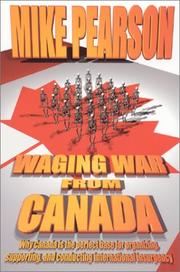Freedom to Read Week
An annual event that encourages Canadians to think about and reaffirm their commitment to intellectual freedom.
Challenged works lists
- Challenged Works ListThe Freedom to Read website maintains a large archive of challenged works. "This selective list provides information about numerous books and some magazines and newspapers that have been challenged in Canada and internationally in past decades." Information from this list was used when producing lists of challenged books found within the University Library's collection.
- Intellectual Freedom Challenges SurveyThe Canadian Federation of Library Associations (CFLA-FCAB) supports the annual Intellectual Freedom Challenges Survey, which "creates a national snapshot of the nature and outcome of challenges to intellectual freedom in publicly-funded Canadian libraries. By documenting and reporting these incidents, Canadian libraries demonstrate their commitment to public accountability and institutional transparency."
Materials from the University Library's collection
 The Adventures of Huckleberry Finn by Mark TwainCall Number: PS1305 .A1 1948Publication Date: 1948Challenged in New Brunswick, 1991. Reason: Racism in characterization and language.
The Adventures of Huckleberry Finn by Mark TwainCall Number: PS1305 .A1 1948Publication Date: 1948Challenged in New Brunswick, 1991. Reason: Racism in characterization and language. The apprenticeship of Duddy Kravitz by Mordecai RichlerCall Number: PR9299 .R53A6 1964ISBN: 0140021795Publication Date: 1959Challenged in various jurisdictions. In 1982, the Etobicoke (ON) Board of Education was asked to ban it from the high school curriculum.
The apprenticeship of Duddy Kravitz by Mordecai RichlerCall Number: PR9299 .R53A6 1964ISBN: 0140021795Publication Date: 1959Challenged in various jurisdictions. In 1982, the Etobicoke (ON) Board of Education was asked to ban it from the high school curriculum.The Arab of the future : a graphic memoir : a childhood in the Middle East (1978-1984) by Riad Sattouf
Call Number: NC1499 .S337A2 2015Publication Date: 2015The patron who challenged this book requested it be removed due to stereotypes being depicted against Jewish, Arabs, homosexuals, French people, and women.As She Grows by Lesley Anne Cowan
Call Number: PR9299.2 .C8737 A78Publication Date: 2003Reason: Sexually explicitBad Medicine by John Reilly
Call Number: KF345 .Z9R45 2010Publication Date: 2010Challenged in Alberta, 2010. Stoney Nakoda leaders objected to the negative portrayal of their government of the reserve. In 2011, the Judicial Council of Alberta found merit in the Stoney Nakodas’ complaint and said that Reilly should resign from the bench if he wanted to make political statements. Banksters and Prairie Boys by Monier M. RahallCall Number: HG3729 .C23 A37Publication Date: 1997Challenged in 1997. One individual named in the book threatened legal action for defamation.
Banksters and Prairie Boys by Monier M. RahallCall Number: HG3729 .C23 A37Publication Date: 1997Challenged in 1997. One individual named in the book threatened legal action for defamation. Barometer Rising by Hugh MacLennanCall Number: PR9299 .M16B 1958Publication Date: 1958Challenged in Manitoba, 1960. Reason: Vulgarity and language.
Barometer Rising by Hugh MacLennanCall Number: PR9299 .M16B 1958Publication Date: 1958Challenged in Manitoba, 1960. Reason: Vulgarity and language.Black Looks : Race and Representation by Bell Hooks
Call Number: E185.86 .H75 1992Held by Canada Customs in 1993 as possible hate literature.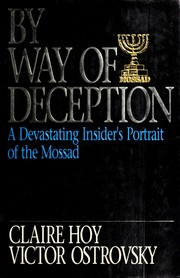 By Way of Deception: A Devastating Insider’s Portrait of the Mossad by Claire Hoy and Victor OstrovskyCall Number: UB271 .I.8.O.87 1990Publication Date: 1990Said to contain “lethal information about Israeli intelligence services.”
By Way of Deception: A Devastating Insider’s Portrait of the Mossad by Claire Hoy and Victor OstrovskyCall Number: UB271 .I.8.O.87 1990Publication Date: 1990Said to contain “lethal information about Israeli intelligence services.”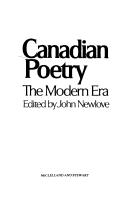 Canadian Poetry: The Modern Era by Edited by John NewloveCall Number: PR9258 .C336 1977Publication Date: 1977Challenged in Ontario, 1987. Reason: Anti-establishment attitudes.
Canadian Poetry: The Modern Era by Edited by John NewloveCall Number: PR9258 .C336 1977Publication Date: 1977Challenged in Ontario, 1987. Reason: Anti-establishment attitudes. A Clockwork Orange by Anthony BurgessCall Number: PR6045 .I.2993C6 1963Publication Date: 1963Challenged in Ontario, 1990, by a parent group. No reason provided.
A Clockwork Orange by Anthony BurgessCall Number: PR6045 .I.2993C6 1963Publication Date: 1963Challenged in Ontario, 1990, by a parent group. No reason provided. Contes pour Buveurs Attardés by Michel TremblayCall Number: PQ3919.2 .T789C76 1996Publication Date: 1996Challenged in Quebec, 2010. Reason: "Promotion of Satan and pedophilia."
Contes pour Buveurs Attardés by Michel TremblayCall Number: PQ3919.2 .T789C76 1996Publication Date: 1996Challenged in Quebec, 2010. Reason: "Promotion of Satan and pedophilia."Dance Me Outside by W.P. Kinsella
Call Number: PR9299.2 .K56D17Publication Date: 1977Challenged in Ontario, 1994. Reason: Not suitable for children.Deliverance by James Dickey
Call Number: PN1997 .D423Publication Date: 1982Challenged in Ontario, 1990, by a parent group. No reason provided. Delta of Venus by Anaïs NinCall Number: PS3527 .I.35D4Publication Date: 1977The patron who challenged this book was concerned that the book contravened the Criminal code for underaged sex.
Delta of Venus by Anaïs NinCall Number: PS3527 .I.35D4Publication Date: 1977The patron who challenged this book was concerned that the book contravened the Criminal code for underaged sex.Doctor Zhivago by Boris Pasternak
Call Number: PG3476 .P27D63 2010Publication Date: 2010A patron requested that this book be removed because of antisemitic passages. Elie et Phaéton : journal 1970-1973 by Gabriel MatzneffCall Number: PQ2673 .A892Z473 1991Publication Date: 1991Libraries in Quebec pulled all books written by Gabriel Matzneff from their shelves in 2020, when allegations of rape prompted authorities in France to open an inquiry.
Elie et Phaéton : journal 1970-1973 by Gabriel MatzneffCall Number: PQ2673 .A892Z473 1991Publication Date: 1991Libraries in Quebec pulled all books written by Gabriel Matzneff from their shelves in 2020, when allegations of rape prompted authorities in France to open an inquiry. Fifty Mighty Men by Grant MacEwan ; illustrated by Wm. W. PerehudoffCall Number: FC3238 .M3 1958Publication Date: 1958Challenged in Alberta. Reason: Insensitivity and racism.
Fifty Mighty Men by Grant MacEwan ; illustrated by Wm. W. PerehudoffCall Number: FC3238 .M3 1958Publication Date: 1958Challenged in Alberta. Reason: Insensitivity and racism.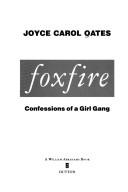 Foxfire by Joyce Carol OatesCall Number: PS3565 .A86F69 1993Publication Date: 1993Challenged in Ontario, 1996. Reason: Obscene and profane language, and graphic scenes of sex and violence.
Foxfire by Joyce Carol OatesCall Number: PS3565 .A86F69 1993Publication Date: 1993Challenged in Ontario, 1996. Reason: Obscene and profane language, and graphic scenes of sex and violence. Gay Ideas by Richard D. MohrCall Number: HQ76.8 .U5M64 1992Publication Date: 1992In 1992, Oxford University Press decided not to distribute or promote the book in Canada, as it had photographs by Robert Mapplethorpe, a controversial American photographer.
Gay Ideas by Richard D. MohrCall Number: HQ76.8 .U5M64 1992Publication Date: 1992In 1992, Oxford University Press decided not to distribute or promote the book in Canada, as it had photographs by Robert Mapplethorpe, a controversial American photographer.The God Delusion by Richard Dawkins
Call Number: BL2775.3 .D39 2006Publication Date: 2006The patron who challenged this book was concerned due to the author being a controversial figure who “frequently makes racist remarks and defends pedophilia”.Habibi by Craig Thompson
Call Number: PN6727 .T48 H33Publication Date: 2011Reason: Nudity, sexually explicit, and unsuited for age group.The Handmaid's Tale by Margaret Atwood
Call Number: PR9299 .A88H3 2017Publication Date: 1985In 2008, a parent formally complained about the use of this novel in a grade 12 class because they said the novel contained “profane language,” anti-Christian overtones, “violence” and “sexual degradation”. Hitler's War by David IrvingCall Number: D757 .I.69 1990Publication Date: 1990Challenged in Ontario, 2004. The complainant said that Irving was a Holocaust denier and that the library should not carry his book.
Hitler's War by David IrvingCall Number: D757 .I.69 1990Publication Date: 1990Challenged in Ontario, 2004. The complainant said that Irving was a Holocaust denier and that the library should not carry his book.How Israel Lost by Richard Ben Cramer
Call Number: DS119.76 .C73Publication Date: 2004Reason: Anti-ethnicity.A Jest of God by Margaret Laurence
Call Number: PR9299 .L379 J5 1993Publication Date: 1993Challenged in Ontario, 1978. Reason: Portrayal of teachers “who had sexual intercourse time and time again, out of wedlock.”Jihad and Genocide by Richard L. Rubenstein
Call Number: BP182 .R83 2010Publication Date: 2010Reason: Anti-ethnicity, insensitivity, in accuracy, political viewpoint, hate. The King's Daughter by Suzanne MartelCall Number: Fic M356753 Ki 1980Publication Date: 1980In 1993, the Regina (SK) Public School Division pulled the book off library shelves after school curriculum consultants decided that the book was inappropriate for students to read unsupervised.
The King's Daughter by Suzanne MartelCall Number: Fic M356753 Ki 1980Publication Date: 1980In 1993, the Regina (SK) Public School Division pulled the book off library shelves after school curriculum consultants decided that the book was inappropriate for students to read unsupervised. Lives of Girls and Women by Alice MunroCall Number: PR9299 .M958L78 1974Publication Date: 1974, c1971Challenged in Ontario, 1976. Reason: Explicit language and descriptions of sex scenes.
Lives of Girls and Women by Alice MunroCall Number: PR9299 .M958L78 1974Publication Date: 1974, c1971Challenged in Ontario, 1976. Reason: Explicit language and descriptions of sex scenes.The Man Sitting in the Corridor by Marguerite Duras; Barbara Bray (Translator)
Call Number: PQ2607 .U72H613 1991Publication Date: 1998Held by Canada Customs in 1993 because of its portrayal of "sex with violence."Mein Kampf by Adolf Hitler; Ralph Manheim (Translator)
Call Number: DD247 .H5A32 1999Publication Date: 1998In 2001, the CEO of Chapters and Indigo ordered that copies of this book by Adolf Hitler be removed from all the bookstore's shelves because she considered it to be hate literature. The Naked and the Dead by Norman MailerCall Number: PS3525 .A29N16 1948Publication Date: 1948Banned by the Minister of National Revenue, 1949. Reason: Obscenity.
The Naked and the Dead by Norman MailerCall Number: PS3525 .A29N16 1948Publication Date: 1948Banned by the Minister of National Revenue, 1949. Reason: Obscenity. Of Mice and Men by John SteinbeckCall Number: PS3537 .T264 O.3 1963Publication Date: 1963Challenged in Alberta, 1994. Reason: Profane and irreligious.
Of Mice and Men by John SteinbeckCall Number: PS3537 .T264 O.3 1963Publication Date: 1963Challenged in Alberta, 1994. Reason: Profane and irreligious.Outlaw Representation by Richard Meyer
Call Number: N8217 .H67M49 2002Publication Date: 2002Challenged in 2002. Oxford University Press decided not to sell the U.S. edition in Canada. The book includes a photograph of a nude boy by Robert Mapplethorpe, and the publisher feared the photograph might trigger criminal charges under Canada’s child pornography law.Paul Kagame and Rwanda by Colin M. Waugh
Call Number: DT450.437 .K34W38 2004Publication Date: 2004Challenged in Toronto, 2005. The book was part of a display about the Great Lakes region of Africa. The student’s family had been killed in the Rwandan massacre of 1994. The book was removed from the display, but not removed from the library. Peyton Place by Grace MetaliousCall Number: PS3525 .E77 P4Publication Date: 1956Banned by Canada Customs, 1956. Reason: "Shocking, coarse, and vulgar."
Peyton Place by Grace MetaliousCall Number: PS3525 .E77 P4Publication Date: 1956Banned by Canada Customs, 1956. Reason: "Shocking, coarse, and vulgar." A time to keep: the Tasha Tudor book of holidays by Tasha TudorCall Number: 394.26 T83Publication Date: 1977Challenged by a patron who was concerned about an image in the book of a child dressed as an indigenous person pretending to scalp someone.
A time to keep: the Tasha Tudor book of holidays by Tasha TudorCall Number: 394.26 T83Publication Date: 1977Challenged by a patron who was concerned about an image in the book of a child dressed as an indigenous person pretending to scalp someone. The Wars by Timothy FindleyCall Number: PR9299 .F495 W3 1989Publication Date: 1989Challenged in Ontario, 2011. Reason: Depictions of sex and violence.
The Wars by Timothy FindleyCall Number: PR9299 .F495 W3 1989Publication Date: 1989Challenged in Ontario, 2011. Reason: Depictions of sex and violence.We Are All Made of Molecules by Susin Nielsen
Call Number: Fic. N6691 Su 2015Publication Date: 2015This book was challenged by a library patron who was concerned that the book contained "inappropriate and explicit language and content".What I Meant to Say by Ian Brown (Editor)
Call Number: HQ1090 .W465Publication Date: 2005Reason: Sexism
Bless Me, Ultima by Rudolfo Anaya
Call Number: PS3551 .N27B58 1994Publication Date: 1994Banned, removed, or challenged by various US schools from 1992 to 2013 for violence and profanity.Blood in the Water: the Attica prison uprising of 1971 and its legacy by Heather Ann Thompson
Call Number: HV9475 .N72A888 2016Publication Date: 2016Banned in several Illinois prisons in 2018 for negative depictions of American prisons.The Bluest Eye by Toni Morrison
Call Number: PS3563 .O.8749B55 1993Publication Date: 1993Banned in a Colorado school in 2006 (and challenged elsewhere) for graphic sexual content.Bury My Heart at Wounded Knee by Dee Brown
Call Number: E81 .B87Publication Date: 1971Banned by a school in Wisconsin in 1974 because it was "controversial".City of Thieves by David Benioff
Call Number: PS3552 .E576C58 2008Publication Date: 2008Banned in a Florida school in 2019, challenged in a Tennessee school in 2016 for vulgar and sexual content. The Color Purple by Alice WalkerCall Number: PS3573 .A386C6 1983Publication Date: 1983Banned and challenged in various US schools starting in 1984 for sexual content and race relations.
The Color Purple by Alice WalkerCall Number: PS3573 .A386C6 1983Publication Date: 1983Banned and challenged in various US schools starting in 1984 for sexual content and race relations.Fear: Trump in the White House by Bob Woodward
Call Number: E912 .W66 2018Publication Date: 2018Donation of book refused at West Virginia Library in 2018 to avoid political polarization.Fun Home : a family tragicomic by Alison Bechdel
Call Number: PN6727 .B3757Z46 2007Publication Date: 2007Banned in Missouri in 2006 because it was claimed to be a form of pornography. God's Little Acre by Erskine CaldwellCall Number: PS3505 .A365G5Publication Date: 1933Banned in Minnesota in 1947 and Boston in 1950 as a form of pornography.
God's Little Acre by Erskine CaldwellCall Number: PS3505 .A365G5Publication Date: 1933Banned in Minnesota in 1947 and Boston in 1950 as a form of pornography. The Group by Mary McCarthyCall Number: PS3525 .A16G88Publication Date: 1963Banned in Italy, Australia, and Ireland for offending public morals.
The Group by Mary McCarthyCall Number: PS3525 .A16G88Publication Date: 1963Banned in Italy, Australia, and Ireland for offending public morals.The Hate U Give by Angie Thomas
Call Number: Fic. T4541 An 2017Publication Date: 2017Banned in Texas schools in 2017 for sexual and drug content. Her Body and Other Parties by Carmen Maria MachadoCall Number: PS3613 .A2725243A6 2017Publication Date: 2017Banned in Missouri prisons for sexual content.
Her Body and Other Parties by Carmen Maria MachadoCall Number: PS3613 .A2725243A6 2017Publication Date: 2017Banned in Missouri prisons for sexual content. The House of the Spirits by Isabel Allende; Magda Bogin (Translator)Call Number: PQ8098.1 .L54C313 1985Publication Date: 1985Challenged in California, Virginia, Maryland, and North Carolina in the 1990s and 2000s for sexual content.
The House of the Spirits by Isabel Allende; Magda Bogin (Translator)Call Number: PQ8098.1 .L54C313 1985Publication Date: 1985Challenged in California, Virginia, Maryland, and North Carolina in the 1990s and 2000s for sexual content.The King Must Die by Mary Renault
Call Number: PR6035 .E55K53 1959Publication Date: 1958Banned in unknown high schools for sexual content.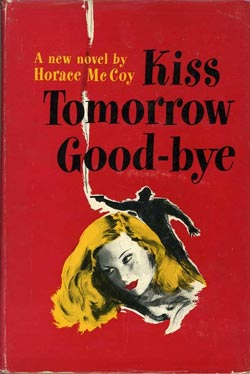 Kiss Tomorrow Goodbye : a novel by Horace McCoyCall Number: PS3525 .A169K6Publication Date: 1948Film version banned in Ohio in 1950s (?) for violent content.
Kiss Tomorrow Goodbye : a novel by Horace McCoyCall Number: PS3525 .A169K6Publication Date: 1948Film version banned in Ohio in 1950s (?) for violent content.The Kite Runner by Khaled Hosseini
Call Number: PS3608 .O.525K58 2003Publication Date: 2003Challenged in multiple US states between 2008 and 2018 for graphic depictions of rape, sex, and profanity. Last Exit to Brooklyn by Hubert Selby, JrCall Number: PS3537 .E37L3Publication Date: 1964Banned in Italy, challenged in U.K. courts in 1960s for obscenity.
Last Exit to Brooklyn by Hubert Selby, JrCall Number: PS3537 .E37L3Publication Date: 1964Banned in Italy, challenged in U.K. courts in 1960s for obscenity.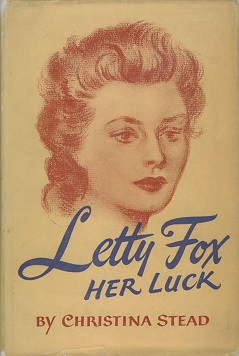 Letty Fox, Her Luck by Christina SteadCall Number: PR9599 .S78L6 1946Publication Date: 1946Banned in Australia in late 1940s for provocative sexual content.
Letty Fox, Her Luck by Christina SteadCall Number: PR9599 .S78L6 1946Publication Date: 1946Banned in Australia in late 1940s for provocative sexual content.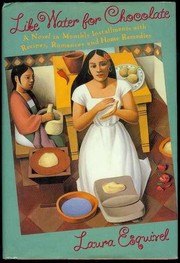 Like Water for Chocolate by Laura EsquivelCall Number: PQ7298.15 .S638C6613 1992Publication Date: 1992Challenged and censored in Texas, Idaho, and Wisconsin between 2005 and 2018 for sexual content.
Like Water for Chocolate by Laura EsquivelCall Number: PQ7298.15 .S638C6613 1992Publication Date: 1992Challenged and censored in Texas, Idaho, and Wisconsin between 2005 and 2018 for sexual content.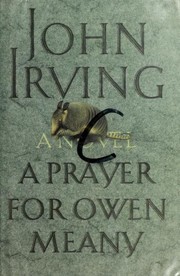 A Prayer for Owen Meany by John IrvingCall Number: PS3559 .R8P7 1989Publication Date: 1989Banned in high schools in Pennsylvania (1990s) and Massachusetts (2000s) for language and sexual content.
A Prayer for Owen Meany by John IrvingCall Number: PS3559 .R8P7 1989Publication Date: 1989Banned in high schools in Pennsylvania (1990s) and Massachusetts (2000s) for language and sexual content.Running with Scissors by Augusten Burroughs
Call Number: PS3552 .U817Z477 2002Publication Date: 2002Challenged but not banned in Michigan, Florida, and Oregon between 2007 and 2018 for sexually explicit material.Snow Falling on Cedars by David Guterson
Call Number: PS3557 .U846S66 1996Publication Date: 1994Challenged (and, in one case, not added to curriculum) by school boards in multiple US states for sex and profanity.Song of Solomon by Toni Morrison
Call Number: PS3563 .O.8749 S6Publication Date: 1977Banned in schools in various US states in 1980s/1990s for sexual and racial content.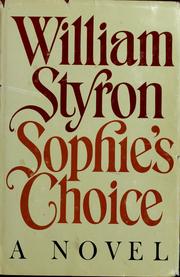 Sophie's Choice by William StyronCall Number: PS3569 .T99S6Publication Date: 1979Banned in South Africa in 1979 and in the United States in 2002 for sexual content.
Sophie's Choice by William StyronCall Number: PS3569 .T99S6Publication Date: 1979Banned in South Africa in 1979 and in the United States in 2002 for sexual content.The Things They Carried by Tim O'Brien
Call Number: PS3565 .B75T48 1990Publication Date: 1990Banned in a Mississippi school in 2003 for profanity.A Wrinkle in Time by Madeleine L'Engle
Call Number: PS3523 .E58W9Publication Date: 1962Challenged in several US states in 1980s and beyond for its depiction of Christianity.
120 Banned Books by Nicholas J. Karolides; Margaret Bald; Dawn B. Sova
Call Number: Z658 .U5K35 2005Publication Date: 2005Tracing the censorship histories of 120 works from around the world, this title provides a summary of each work, its censorship history, and suggestions for further reading. Updates to existing entries cover new controversies regarding such classic books as 'Huckleberry Finn' and 'The Canterbury Tales'.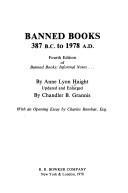 Banned Books, 387 B.C. to 1978 A.D. by Anne L. HaightCall Number: Z1019 .H15 1978Publication Date: 1999
Banned Books, 387 B.C. to 1978 A.D. by Anne L. HaightCall Number: Z1019 .H15 1978Publication Date: 1999 The Banned Books of England and Other Countries, a Study of the Conception of Literary Obscenity by Alec CraigCall Number: Z659 .C88 1962Publication Date: 1962
The Banned Books of England and Other Countries, a Study of the Conception of Literary Obscenity by Alec CraigCall Number: Z659 .C88 1962Publication Date: 1962Banned in Boston by Neil Miller
Call Number: HV6795 .B7M55 2010Publication Date: 2010"I want to be intelligent, even if I do live in Boston." --an anonymous Bostonian, 1929. In this spectacular romp through the Puritan City, Neil Miller relates the scintillating story of how a powerful band of Brahmin moral crusaders helped make Boston the most straitlaced city in America, forever linked with the infamous catchphrase "Banned in Boston."Beyond Banned Books by Kristin Pekoll
Call Number: eBookPublication Date: 2019Equitable access to information for all, including underserved populations, is a core value of librarianship. The growing awareness of where this inequality persists has led many professionals to take steps to advance social justice within their institutions, from creating book displays about the Black Lives Matter movement or LGBT History Month to hosting programs by potentially controversial speakers. But while libraries are often well-versed in protecting the right to read books, many lack policies and experience in addressing censorship of resources and services. This resource from Pekoll, Assistant Director of the American Library Association's Office for Intellectual Freedom (OIF), uses specific case studies to offer practical guidance on safeguarding intellectual freedom related to library displays, programming, and other librarian-created content.Burning the Books by Richard Ovenden
Call Number: Z659 .O.94 2020Publication Date: 2020The director of the famed Bodleian Libraries at Oxford narrates the global history of the willful destruction--and surprising survival--of recorded knowledge over the past three millennia. Libraries and archives have been attacked since ancient times but have been especially threatened in the modern era. Today the knowledge they safeguard faces purposeful destruction and willful neglect; deprived of funding, libraries are fighting for their very existence. Burning the Books recounts the history that brought us to this point. Richard Ovenden describes the deliberate destruction of knowledge held in libraries and archives from ancient Alexandria to contemporary Sarajevo, from smashed Assyrian tablets in Iraq to the destroyed immigration documents of the UK Windrush generation. He examines both the motivations for these acts--political, religious, and cultural--and the broader themes that shape this history. He also looks at attempts to prevent and mitigate attacks on knowledge, exploring the efforts of librarians and archivists to preserve information, often risking their own lives in the process.The Censor's Library by Nicole Moore
Call Number: eBookPublication Date: 2013The first comprehensive examination of Australian book censorship, this enlightening and enthralling discussion is based on Nicole Moore's discovery of the secret "censor's library" in the National Archives. Combining scholarship with the narrative tension of a thriller,the book exposes the scandalous history of censorship in Australia.Dear Sir, I Intend to Burn Your Book : An anatomy of a book burning by Lawrence Hill
Call Number: eBookPublication Date: 2013Censorship and book burning are still present in our lives. Lawrence Hill shares his experiences of how ignorance and the fear of ideas led a group in the Netherlands to burn the cover of his widely successful novel, The Book of Negroes, in 2011. Why do books continue to ignite such strong reactions in people in the age of the Internet? Is banning, censoring, or controlling book distribution ever justified? Hill illustrates his ideas with anecdotes and lists names of Canadian writers who faced censorship challenges in the twenty-first century, inviting conversation between those on opposite sides of these contentious issues. All who are interested in literature, freedom of expression, and human rights will enjoy reading Hill's provocative essay.Keep Them Reading by ReLeah Cossett Lent; Gloria Pipkin
Call Number: LC72.2 .L46 2013Publication Date: 2012Keep Them Reading is a concise handbook for teachers, librarians, administrators, and district personnel about how to prevent censorship in a school or district--and what to do if it happens. Written by two award-winning authors who have devoted much of their careers to anti-censorship work, this book discusses the overall importance of reading in all academic endeavors and demonstrates how challenges and censorship can derail even the best literacy program. Each chapter contains practical tools, advice, and resources for building understanding about issues of intellectual freedom and for creating a plan to help all parties work through challenges before they turn into damaging censorship incidents. The last chapter contains advice from authors who have dealt with censorship, such as Judy Blume, and experts on the subject, such as Joan Bertin, executive director of the National Coalition Against Censorship.Literature Suppressed on Political Grounds by Nicholas J. Karolides
Call Number: Z658 .U5K37 1998Publication Date: 1998Gives plot synopses of 105 works of fiction and nonfiction censored for their political content, and details the censorship history of each. Works covered include Black Boy, Gulliver's Travels, Inside the Company: CIA Diary, and One Day in the Life of Ivan Denisovich . Includes biographical profLiterature Suppressed on Religious Grounds by Margaret Bald
Call Number: BL65 .C45B35 1998Publication Date: 1998Discusses some 100 books that have been targets of religious censorship over the centuries, encompassing texts of the world's major religions, novels, and classic works of philosophy, science, and history, as well as contemporary works. Alphabetical entries describe the content of each work and revLiterature Suppressed on Social Grounds by Dawn B. Sova
Call Number: Z658 .U5S698 1998Publication Date: 1998From Uncle Tom's Cabin to East of Eden, and from One Flew Over the Cuckoo's Nest to I Know Why the Caged Bird Sings, and more. Nihil Obstat by Thomas Fisher Rare Book Library Staff (Contribution by); Pearce J. CarefooteCall Number: Z1019 .T48 2005Publication Date: 2005
Nihil Obstat by Thomas Fisher Rare Book Library Staff (Contribution by); Pearce J. CarefooteCall Number: Z1019 .T48 2005Publication Date: 2005
- Battle over the Books : Censorship in American SchoolsJohn Scopes went on trial for teaching Darwin's theory of evolution; nearly 70 years later, an Illinois English teacher was confronted by protesters who demanded that J. D. Salinger's Catcher in the Rye "not be assigned for reading" - adding that their demand should not be interpreted as "censorship or banning books." Whatever it's called, it means that books are under attack - from "Cinderella" to Huckleberry Finn. This program looks at how teachers can prepare themselves against attack, and looks at those who, in the name of religion or equality or whatever cause, are aiming the censor's gun at teachers and books.
- The Book That Shook the WorldTHE BOOK THAT SHOOK THE WORLD is a historical essay film that delves into the controversy and uproar brought about by the publication in Australia and in Europe of The Little Red Schoolbook by Soren Hansen and Jesper Jensen, where in many countries it was banned while also looking at the repressive censorship laws Australia lived under in the sixties and early seventies.The Book That Shook the World shows how change was brought about by the actions of people willing to risk gaol for their anti censorship beliefs. Using The Little Red Schoolbook, and other publications of the time it traces the change and development of censorship laws and attitudes in Australia, asking in conclusion, as the film is brought up to date - how far have we really come? At the same time it is often an amusing look at the cultural hypocrisies Australians were living under, and the sometimes hilarious lengths authorities went to, to prevent change, while others tried to bring change about. Featuring a mixture of experts, participants of the time and questioning narration all inter-cut with clips from the period such as, news archives, and publications the period comes to life.
- Launch / PBSHas a section on banned books.
The country’s 100 favorite novels are announced in this celebration of reading, hosted by Meredith Vieira. With titles on the list spanning four centuries, authors from 15 countries, and every genre imaginable, it is clear that America’s taste in novels is as diverse as the people who make up our nation.
- Last Updated: Feb 21, 2024 5:12 PM
- URL: https://libguides.usask.ca/ftrw
- Print Page
University of Saskatchewan
The University of Saskatchewan's main campus is situated on Treaty 6 Territory and the Homeland of the Métis.
© University of Saskatchewan
Disclaimer|Privacy

